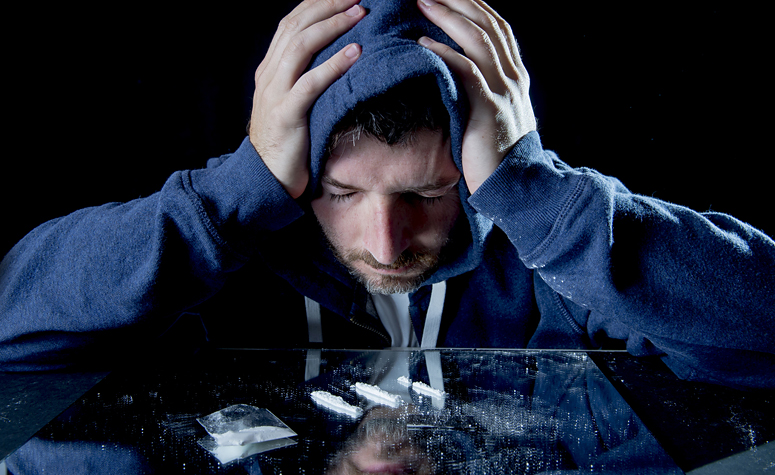Cocaine Addiction Treatment
Cocaine is the second-most consumed illegal narcotic in the UK, with 1 in every 40 citizens regularly consuming the substance. Experts point out that UK residents consume more cocaine than those in any other European country. The primary reason behind this recent uptick in consumption is the highly addictive nature of cocaine. Often, a single use is enough to lead an individual to full-on addiction.
There are multiple reasons why individuals develop a cocaine addiction. At AddictionRehab, we believe that acknowledging an addiction is a crucial first step towards recovery, and there is no shame in doing so. Our experts, with years of experience in cocaine addiction treatment, approach every case with care and understanding. Their primary goal is to mitigate addictive behaviour and ultimately achieve complete recovery.

What is Cocaine Addiction Treatment?
The initial stride towards recovery involves acknowledging the presence of addiction. This acknowledgement can be a personal realisation or involve initiating a conversation to encourage someone to discuss their cocaine addiction. Once this challenging step is taken, the path to seeking treatment for the addiction becomes clearer. more accessible and be seen as a feasible solution.
Cocaine addiction treatment aims to assist individuals, or their family members and loved ones, in abstaining from substance abuse. At AddictionRehab, you will receive bespoke guidance from trained professionals in a safe and secure environment. Our experts will assist you in recognising your dependency on the drug and subsequently address these issues effectively. This process involves developing new coping mechanisms, enhancing self-esteem, and fostering a positive outlook.
Throughout your recovery journey, you will be under the constant care of seasoned professionals. We ensure that you receive comprehensive support and tailor treatment modalities that align with your individual level of addiction at AddictionRehab.

Sometimes the smallest step in the right direction
ends up being the biggest step of your life
Tiptoe if you must, but take the step
How do I Know if I Need Cocaine Addiction Help?
Individuals often don’t seek medical help with addiction until it becomes exceptionally severe and feeling of desperation takes over. However, there are certain signs that can indicate addictive behaviour. The most common involve prioritising the consumption of cocaine over familial and social connections.
Other indicators of addictive behaviour from cocaine overconsumption include:
- Needing increasingly higher doses of cocaine to feel the same positive effects
- Having high energy levels
- Acting impulsively
- Talking extremely fast
- Heightened body temperature
- Inadequate decision-making abilities
Physical and psychological harm is inevitable when you consume ever-increasing amounts of cocaine. However, it cannot be understated how much this form of addiction affects your social life. When addicted to this substance, you will find difficulty in maintaining your current relationships. Both your professional and private life will be significantly affected by your constant need to consume more and more of the harmful drug. Ultimately, addiction leads to a complete dependence on the substance, marking a crucial point at which to seek the much-needed assistance and therapy.
Specialist treatment can assist in addressing any past damage caused by cocaine misuse and empower you to prevent further harm.
If you or someone you know is exhibiting these symptoms, it may be time to consult a specialist and seek addiction treatment. Trying to quit without support can be challenging, but with the right treatment, it’s possible to stop using cocaine and lead a happy, healthy life.
Crack Cocaine Addiction
Crack is a crystallised form of cocaine, receiving its name from the distinct sound it makes when heated. Individuals who consume crack often smoke it, experiencing an immediate and intense high. However, unlike with powdered cocaine, the effects of crack subside as quickly as they manifest. Users will often try to replicate the effect through repeated usage, leading to addictive behaviour forming much more quickly than it would with powdered cocaine.
We offer treatment programmes for both regular and crack cocaine addiction. Depending on the severity of addiction, therapy may include detoxification, conducted by our medical experts using state-of-the-art methods and tools.

How Does Cocaine Addiction Treatment Work?
When a patient enters our care, they are provided with a comprehensive, multilayered, and round-the-clock treatment programme. You will receive all necessary care within a safe, well-equipped environment designed to support individuals facing addiction at any level.
Your therapy can be part of our 28-day Addiction Treatment Programme, tailored to suit your individual condition and its severity.
Your journey towards recovery from cocaine addiction will be tailored to meet your specific needs and may include:
- Undergoing a cocaine detoxification programme
- Participating in residential rehabilitation for cocaine addiction
- Engaging in various forms of therapy (individual and/or group sessions)
Depending on the extent and intensity of your addiction, options such as daycare therapy and outpatient treatment may also be considered. The primary objective of our cocaine addiction treatment is achieving abstinence from cocaine use.
Multiple factors will affect your recovery progress, including:
- Your desires, needs, and goals
- Your overall progress
- The presence and severity of any additional mental health issues
- The extent of support you are receiving

Fast Access to Residential Treatment
We are currently able to offer fast access to private inpatient treatment. Please call us today and speak to one of our expert advisors.
Call in confidence: 0800 0148 970
What are the Treatment Options for Cocaine
Putting an end to cocaine addiction involves a variety of treatment methods and options which commonly include the following:
Detoxification
Detoxification is often the initial step in treating cocaine addiction. This process involves eliminating cocaine from the body while managing withdrawal symptoms. In the UK, detox is typically conducted under medical supervision, either in a hospital or a specialised detox facility, to ensure the safety and comfort of the individual. Medications may be used to alleviate withdrawal symptoms and reduce cravings.
Inpatient rehabilitation
Inpatient rehabilitation programs provide intensive, structured care in a residential setting. These programs, which can last from 28 days to several months, offer a range of services, including:
- Rapport building
Continuous monitoring and medical treatment
- The debriefing stage
Individual, group, and family therapy sessions
- Life skills training
Teaching practical skills for daily living
- Relapse prevention
Strategies to maintain sobriety post-treatment
Inpatient rehab is particularly beneficial for those with severe addiction or co-occurring mental health disorders, providing a supportive environment free from external triggers. In the UK, many private and NHS-funded rehab centres offer these services.
Outpatient rehabilitation
Outpatient rehabilitation programs provide flexibility for individuals who need treatment but cannot commit to an inpatient program. These programs allow patients to live at home and continue with their daily responsibilities while attending scheduled treatment sessions. Outpatient rehab typically includes:
- Counselling
Regular individual and group therapy sessions
- Education
Information on addiction and coping strategies
- Peer support groups
Engaging with groups like Narcotics Anonymous (NA) or Cocaine Anonymous (CA)
Outpatient treatment is more suitable for those individuals with a strong support system and a less severe addiction.

Different Therapies for Cocaine Addiction During Treatment
Cocaine addiction is a pervasive issue that can have devastating effects on individuals and their loved ones. However, various therapeutic approaches have been developed to address this challenging condition, offering hope and pathways to recovery. This guide provides an overview of the different therapies available for treating cocaine addiction.
Cognitive behavioural therapy (CBT)
Cognitive behavioural therapy is one of the most widely used and effective treatments for cocaine addiction. CBT focuses on identifying and changing negative thought patterns and behaviours that contribute to substance use. Key components of CBT include:
- Recognising triggers
Identifying situations, thoughts, or feelings that trigger cocaine use
- Developing coping strategies
Learning new ways to cope with stress and cravings
- Building problem-solving skills
Enhancing the ability to handle challenging situations without resorting to drug use
CBT is often delivered in individual or group settings and can be tailored to the specific needs of the patient.
Contingency management (CM)
Contingency Management is a behavioural therapy that uses positive reinforcement to encourage sobriety. Patients receive rewards or incentives for maintaining abstinence and reaching specific treatment goals. Examples of rewards include:
- Vouchers
Exchangeable for goods or services
- Cash prizes
Monetary rewards for clean drug tests
- Privileges
Access to special activities or outings
CM has been shown to be a highly effective form of addiction rehabilitation in reducing drug use and improving treatment retention.
Motivational interviewing (MI)
Motivational Interviewing is a patient-centered approach that aims to enhance an individual’s motivation to change their behaviour. MI involves:
- Expressing empathy
Understanding the patient’s perspective and feelings
- Developing discrepancy
Helping patients see the gap between current behaviour and their personal goals
- Rolling with resistance
Avoiding direct confrontation and instead working through the patient’s ambivalence
- Supporting self-efficacy
Encouraging belief in the ability to change
MI is often used in conjunction with other therapies to strengthen the individual’s commitment to recovery.
12-Step Programs
12-Step Programs, such as Cocaine Anonymous (CA) and Narcotics Anonymous (NA), provide a structured approach to recovery based on mutual support and shared experiences. Key elements of 12-Step Programs include:
- Admitting powerlessness over addiction
Recognising the need for help
- Seeking help from a higher power
Finding spiritual or philosophical support
- Making amends
Addressing past mistakes and repairing relationships
- Helping others
Supporting others in their recovery journey
These programs emphasise peer support and accountability, often through regular meetings and sponsorship relationships.
Family therapy
Family Therapy involves the patient’s family in the treatment process, addressing the impact of addiction on the entire family system. Goals of family therapy include:
- Improving communication
Enhancing understanding and reducing conflict
- Rebuilding trust
Repairing relationships damaged by addiction
- Developing supportive dynamics
Creating a supportive home environment conducive to recovery
Family therapy can be particularly beneficial in helping individuals to build a strong support network which can play a pivotal role in the recovery journey.

Sometimes the smallest step in the right direction
ends up being the biggest step of your life
Tiptoe if you must, but take the step
Your Next Steps
Regardless of your current stage in your experience with cocaine, it’s always a fitting time to think about recovery. Our team at AddictionRehab is thoroughly experienced in all aspects of cocaine addiction support. While the decision to begin the journey towards well-being is yours to make, we are here to provide support and guidance on how to effectively proceed, ensuring you have the necessary support every step of the way.
FREE Drug Addiction Assessment
If you or a loved one are struggling with drug addiction, we understand the challenges you’re facing and we’re here to offer compassionate help.
Our highly trained advisers are available to speak to you right away, simply call 0808 252 3379 today.
We can discuss your concerns in complete confidence, explore the options for treatment, and help you to understand what will work best for you.
We’ll also help you to book your free drug addiction assessment there and then, with appointments usually available within only a few days.
We understand that taking the first step can be the most difficult, but we’re here to support – with no pressure or judgement.
Professional and compassionate help is just a phone call or click away.




